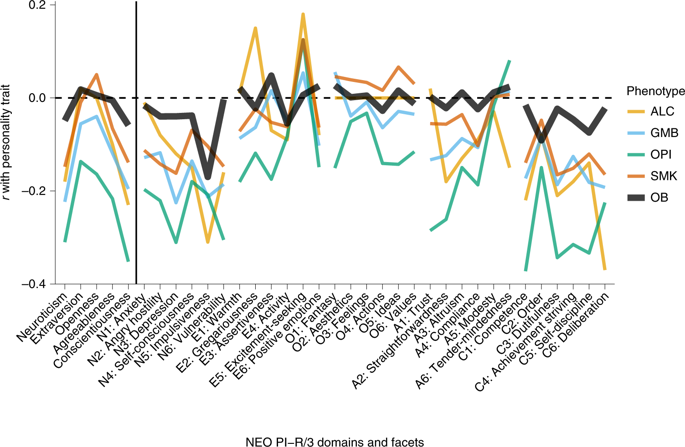当前位置:
X-MOL 学术
›
Nat. Hum. Behav.
›
论文详情
Our official English website, www.x-mol.net, welcomes your
feedback! (Note: you will need to create a separate account there.)
Obesity has limited behavioural overlap with addiction and psychiatric phenotypes.
Nature Human Behaviour ( IF 21.4 ) Pub Date : 2019-10-28 , DOI: 10.1038/s41562-019-0752-x Uku Vainik 1, 2 , Bratislav Misic 1 , Yashar Zeighami 1 , Andréanne Michaud 1 , Rene Mõttus 2, 3 , Alain Dagher 1
Nature Human Behaviour ( IF 21.4 ) Pub Date : 2019-10-28 , DOI: 10.1038/s41562-019-0752-x Uku Vainik 1, 2 , Bratislav Misic 1 , Yashar Zeighami 1 , Andréanne Michaud 1 , Rene Mõttus 2, 3 , Alain Dagher 1
Affiliation

|
Obesity is a widespread health condition1, likely to be driven by the increased availability of inexpensive high-calorie food2. People vary greatly in their behavioural response to food. Such variation is likely to be driven by behavioural styles3,4, as behaviour accounts for overall food intake5. A prominent hypothesis is that people with obesity respond to rewards similarly to people with addictions such as alcohol abuse or smoking6,7. For instance, perceived overeating or 'uncontrolled eating' (UE) is the most common obesity-associated personality trait8 and resembles the perceived loss of control seen in drug addiction. Likewise, both obesity and addictive behaviours have similar correlations with broad personality domains3. Here we seek to empirically test whether obesity and UE overlap behaviourally with addiction and psychiatric disorders, collectively referred to as phenotypes. We test for behavioural similarity by linking the personality profiles of each phenotype. NEO Personality Inventory profiles of 28 phenotypes were extracted from 22 studies, encompassing summary statistics from 18,611 unique participants. Obesity had moderate and UE high behavioural similarity with addictions. UE also overlapped behaviourally with most psychiatric phenotypes, whereas obesity was behaviourally similar with mood disorders and certain personality disorders. Facet-based phenotype profiles provided more information than domain-based profiles.
中文翻译:

肥胖与成瘾和精神病表型的行为重叠有限。
肥胖是一种普遍的健康状况,1可能是由于廉价高热量食物2的供应量增加所致。人们对食物的行为反应差异很大。这种变化很可能是由行为方式3、4驱动的,因为行为占整体食物摄入量的5。一个著名的假设是,肥胖症患者对奖赏的反应与酗酒或吸烟等成瘾者的反应相似[6,7]。例如,暴饮暴食或“饮食失控”(UE)是最常见的与肥胖相关的人格特质8,类似于在吸毒成瘾中感觉到的失控。同样,肥胖和成瘾行为与广泛的人格领域具有相似的相关性3。在这里,我们试图通过经验测试肥胖和UE是否与成瘾和精神疾病(行为统称为表型)在行为上重叠。我们通过链接每个表型的人格特征来测试行为相似性。从22项研究中提取了28种表型的NEO人格量表概况,其中包括来自18,611位独特参与者的摘要统计数据。肥胖与中毒有中度和UE高的行为相似性。UE在行为上与大多数精神病学表型重叠,而肥胖在行为上与情绪障碍和某些人格障碍相似。基于方面的表型配置文件比基于域的配置文件提供了更多的信息。从22项研究中提取了28种表型的NEO人格量表概况,其中包括来自18,611位独特参与者的摘要统计数据。肥胖与中毒有中度和UE高的行为相似性。UE在行为上与大多数精神病学表型重叠,而肥胖在行为上与情绪障碍和某些人格障碍相似。基于方面的表型配置文件比基于域的配置文件提供了更多的信息。从22项研究中提取了28种表型的NEO人格量表概况,其中包括来自18,611位独特参与者的摘要统计数据。肥胖与中毒有中度和UE高的行为相似性。UE在行为上与大多数精神病学表型重叠,而肥胖在行为上与情绪障碍和某些人格障碍相似。基于方面的表型配置文件比基于域的配置文件提供了更多的信息。
更新日期:2019-10-28
中文翻译:

肥胖与成瘾和精神病表型的行为重叠有限。
肥胖是一种普遍的健康状况,1可能是由于廉价高热量食物2的供应量增加所致。人们对食物的行为反应差异很大。这种变化很可能是由行为方式3、4驱动的,因为行为占整体食物摄入量的5。一个著名的假设是,肥胖症患者对奖赏的反应与酗酒或吸烟等成瘾者的反应相似[6,7]。例如,暴饮暴食或“饮食失控”(UE)是最常见的与肥胖相关的人格特质8,类似于在吸毒成瘾中感觉到的失控。同样,肥胖和成瘾行为与广泛的人格领域具有相似的相关性3。在这里,我们试图通过经验测试肥胖和UE是否与成瘾和精神疾病(行为统称为表型)在行为上重叠。我们通过链接每个表型的人格特征来测试行为相似性。从22项研究中提取了28种表型的NEO人格量表概况,其中包括来自18,611位独特参与者的摘要统计数据。肥胖与中毒有中度和UE高的行为相似性。UE在行为上与大多数精神病学表型重叠,而肥胖在行为上与情绪障碍和某些人格障碍相似。基于方面的表型配置文件比基于域的配置文件提供了更多的信息。从22项研究中提取了28种表型的NEO人格量表概况,其中包括来自18,611位独特参与者的摘要统计数据。肥胖与中毒有中度和UE高的行为相似性。UE在行为上与大多数精神病学表型重叠,而肥胖在行为上与情绪障碍和某些人格障碍相似。基于方面的表型配置文件比基于域的配置文件提供了更多的信息。从22项研究中提取了28种表型的NEO人格量表概况,其中包括来自18,611位独特参与者的摘要统计数据。肥胖与中毒有中度和UE高的行为相似性。UE在行为上与大多数精神病学表型重叠,而肥胖在行为上与情绪障碍和某些人格障碍相似。基于方面的表型配置文件比基于域的配置文件提供了更多的信息。











































 京公网安备 11010802027423号
京公网安备 11010802027423号